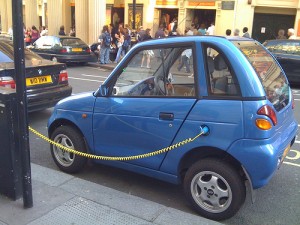Most Americans confused about plug-in hybrid, electric vehicles, survey says


A hybrid, a gas/electric car, an all-electric vehicle, a plug-in hybrid -- what do all those words mean? Turns out, most Americans don't know the answer. Even though a new hybrid or electric car seems to be launching on a weekly basis these days, a survey conducted by research firm Synovate finds that a majority of new-car buyers are still confused about the varied options available and that the lack of knowledge could prove a significant barrier to sales.
Most consumers don't even understand the difference between a hybrid and a plug-in car, the survey found.
The results are quite shocking: Only 50 percent of the 1,900 or so respondents interviewed knew that plug-in hybrids had an additional battery pack, while only two-thirds know that they use both gasoline and batteries. With pure hybrids, only one-third of respondents knew that they had an electric-only mode (albeit one with a really small range); and about 28 percent thought that hybrids didn't have a tailpipe. The same number also assumed that hybrid vehicles needed more than 15 minutes to refuel. All this after the hybrid has been in the market for over 10 years.
While companies like Nissan seem to have done a better job disseminating knowledge about pure-electric vehicles, most people were still really confused about charge times and emissions.
As Stephen Popiel, senior vice president of Synovate Motoresearch, says, "This low level of understanding about the way in which electric powertrain vehicles work will have profound consequences for vehicle sales. In the short term, dealers will have to spend an inordinate amount of time explaining the workings of PHEVs and BEVs to interested buyers. We have to wonder if consumers will become disillusioned when they understand the actual requirements of electric vehicles. Will the person who goes to their Chevy dealer to buy a Volt, or their Nissan dealer to buy a Leaf, still buy the vehicle once they discover the need for plugs and 220 volt outlets? And, if they become discouraged with the electric option, will they stay and buy a different Chevy or Nissan vehicle? Or simply leave in confusion?"
Popiel also believes that the government should play a bigger role in educating the public about the different options available.
"There needs to be a significant consumer education process to explain why we must move from a petroleum-based powertrain to an electric based powertrain," said Popiel. "The awareness campaign would have to address questions of environmental protection and national security, i.e. dependence on foreign oil leaves our society vulnerable to outside disruptions."
What do you think? Is the media doing a good enough job educating the public about the different drivetrains available? Should the government play a bigger role in educating the public?
The survey:
* Update: BEV = Battery Electric Vehicle, PHEV: Plug-in Hybrid Electric Vehicle, HEV = Hybrid Electric Vehicle.
Via Synovate
This post was originally published on Smartplanet.com
